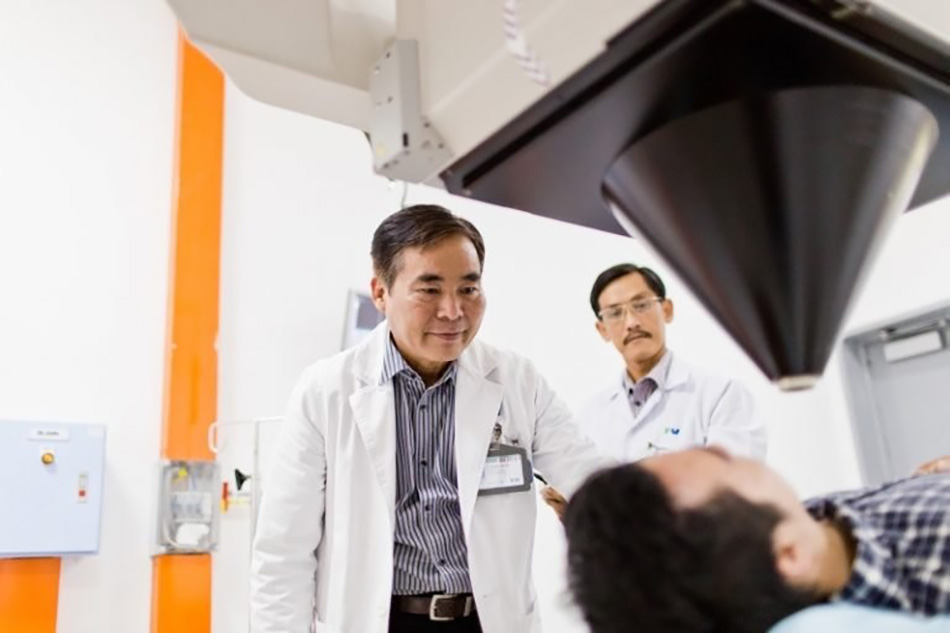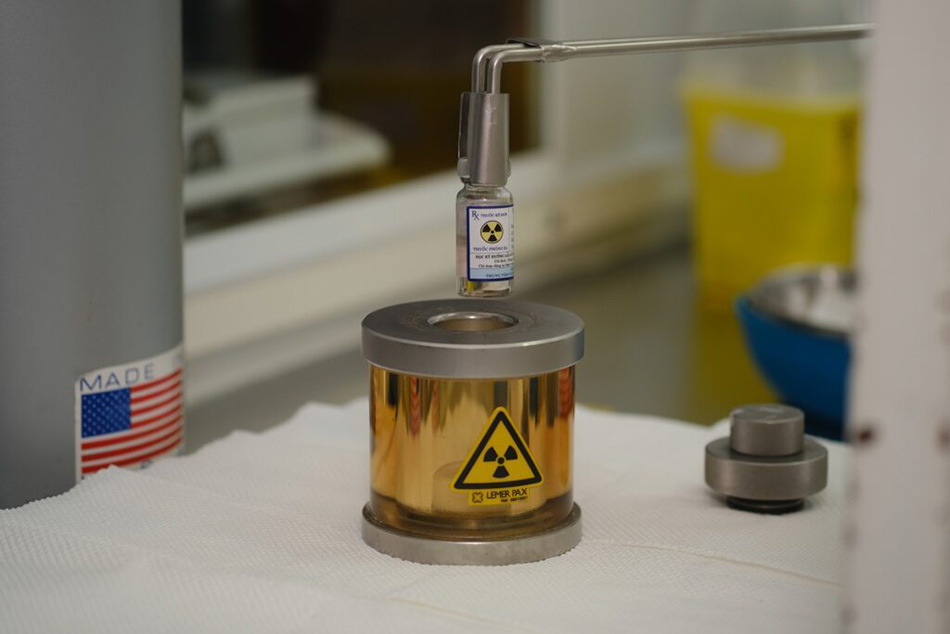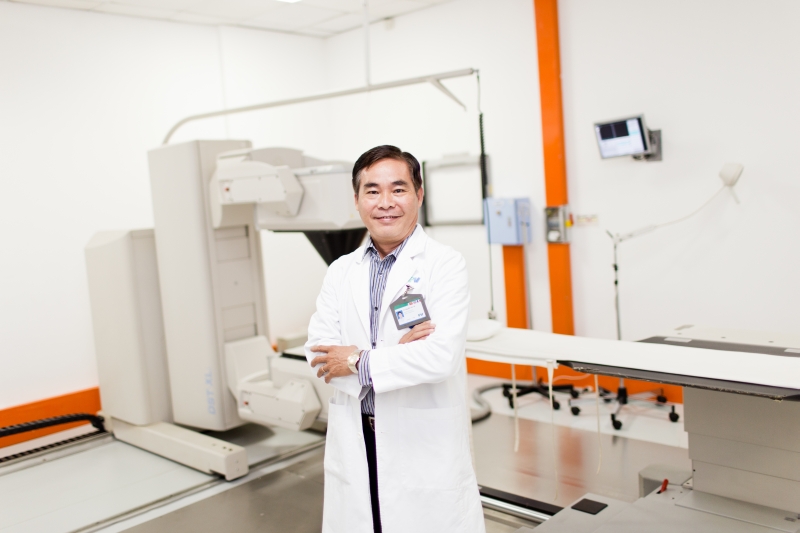Nuclear medicine therapy can be applied to treat enlarged goitres in cases where the thyroid gland is relatively large and unresponsive to thyrostatic medications. This method is considered a “non-surgical” approach that offers high effectiveness, safety, and fewer side effects compared to surgery.
Symptoms of hyperthyroidism can be easily confused with other medical conditions.
Ms NTL (residing in Ba Ria – Vung Tau) experienced fatigue, weight loss despite increased appetite, and prolonged insomnia. She visited multiple healthcare facilities but her condition remained undiagnosed. Over time, her health deteriorated further. For many months, she had to sleep sitting up because lying down caused difficulty breathing and rapid heartbeat. It wasn’t until she sought treatment at FV Hospital that doctors conducted tests and diagnosed her with hyperthyroidism, a condition whose symptoms are often confused with other illnesses.
This is also why many people fail to detect the disease early which would allow for timely treatment. Late-stage detection can lead to severe complications and making treatment more complex.

Hyperthyroidism is a condition with symptoms that are easily mistaken for other diseases.
According to Dr Nguyen Van Te, Head of Nuclear Medicine Department at FV Hospital, hyperthyroidism is a condition where the thyroid gland produces an excessive amount of thyroid hormone, leading to and increased metabolism. This can cause significant heat generation, making patients feel hot and experience weight loss despite increased food intake. Dr Te stated, “Many people can eat two bowls of pho at once and still feel hungry, and they can lose up to 8 kg in a month.” Hyperthyroidism affects the nervous system, causing symptoms such as difficulty concentrating, irritability, tremors, and mood swings. In women, it can lead to irregular or absent menstrual periods. The condition may also lead to cardiovascular complications such as arrhythmias and shortness of breath due to heart failure, especially in older patients, and it can also affect the liver.
Some of the main causes of hyperthyroidism include: increased blood vessel growth in the thyroid gland due to antibodies attacking the TSH receptor (which stimulates the thyroid gland), stimulating excessive hormone production and blood flow; acute thyroiditis due to bacteria or sub-acute – often caused by respiratory viruses; excessive use of thyroid hormone medication; excessive iodine intake or prolonged use of iodine-containing medications.
If not detected and treated promptly, hyperthyroidism can lead to many serious complications such as: Cardiovascular complications: Rapid heart rate and palpitations, which can lead to heart failure; Thyroid storm (acute thyroiditis) is sudden increase in hormone levels, life-threatening; liver damage; in addition to the disease that can come out into malignant eyes: Exophthalmos, tearing, light sensitivity, conjunctivitis, and corneal damage.
Diagnosing and treating hyperthyroidism with nuclear medicine
According to Dr Nguyen Van Te, when there are suspected signs of hyperthyroidism, patients should consult a doctor for examination. The doctor may recommend blood tests to measure thyroid hormone levels, quantify TSH receptor antibodies, and perform neck ultrasound to detect structural disorders of the thyroid gland, such as enlarged size, increased blood flow, or nodules within the thyroid tissue.
In cases requiring precise diagnosis of the underlying cause of hyperthyroidism, the doctor may recommend a thyroid scan utilising nuclear medicine. The patient receives a small dose of radioactive tracer, typically 99mTc, this is injected into a vein. As the tracer circulates in the bloodstream, it accumulates in thyroid tissue and emits signals detected by a gamma camera. This imaging technique allows the doctor to accurately assess thyroid function, identify thyroid disorders at early stages, and facilitate timely treatment. The amount of radiation used in these scans is minimal; it naturally clears from the body through excretion and poses no harm to the body.

Dr Nguyen Van Te, Head of Nuclear Medicine Department at FV Hospital, performs thyroid imaging for patients.
After being diagnosed with hyperthyroidism, patients are typically treated with thyrostatic medications for 18-24 months, at personalised dosages. The medication is discontinued once the hyperthyroidism is controlled.
In cases where the goiter is excessivly large or the patient does not respond to medications, doctors may recommend surgical removal of the goiter or use nuclear medicine techniques – specifically, treatment with radioactive iodine-131 (I-131).
The procedure for treating hyperthyroidism with I-131 is relatively simple: the patient is prescribed and takes the medication as directed by the doctor. I-131 concentrates in the thyroid gland to destroy abnormal cells. This method is likened to “non-surgical surgery”, as it is easy to administer, highly effective, has minimal side effects, and is cost-effective. Patients typically do not need hospitalisation but are advised to limit close contact with others (maintaining a distance of over 1 meter) for about a week. It is crucial that patients do not become pregnant before treatment and for 6-12 months after taking the radioactive medication.

Radioactive iodine-131 (I-131) medication is used in the treatment of hyperthyroidism.
In nuclear medicine, I-131 is also reccomended for treating thyroid cancer after surgical removal of the differentiated thyroid cancer (papillary or follicular types). Its purpose is to destroy remaining thyroid tissue, eliminate thyroid cancer cells, and prevent recurrence. Patients may require isolation either at home or in the hospital depending on the dosage used. This method boasts a success rate of up to 90%.
According to Dr Te, patients may develop hypothyroidism after treatment for thyroid disorders using either surgical or nuclear medicine methods. However, simply supplementing with thyroid hormone orally as prescribed by the doctor allows patients to return to normal life.
Does radioactive iodine treatment for hyperthyroidism affect fertility?
Thyroid disorders can affect women’s reproductive health, with hyperthyroidism increasing thyroid hormone levels, disrupting menstrual cycles, and temporarily increasing the risk of infertility. Therefore, women are advised by doctors to stabilise hyperthyroidism to improve their chances of pregnancy. However, many young patients are concerned if the radioactive iodine treatment for hyperthyroidism will affect their fertility?

Treatment with nuclear medicine at FV Hospital is conducted according to a highly safe procedures.
Dr Te recounted a successful case of treating hyperthyroidism with nuclear medicine that led to a successful pregnancy, “Once there was a young female patient in her reproductive years that had been unsuccessfully treating her hyperthyroidism with medications for many years. Despite being married, she had never conceived, so she was determined to undergo definitive treatment to improve her chances of pregnancy. She came to FV Hospital for examination and was recommended nuclear medicine therapy for her hyperthyroidism. Due to the relatively large size of her goiter, she underwent two treatments within a six-month period. Afterward, she was prescribed thyroid hormone replacement therapy. Several years later, her health stabilised, she became pregnant, and subsequently gave birth to a healthy child. During her recent follow-up at FV Hospital, her health was reported to be very good.”
Dr Te explained that after successful treatment with nuclear medicine, women of reproductive age can conceive normally. At the FV Hospital Nuclear Medicine Department, the treatment process is carried out with high safety measures, ensuring no adverse effects on general health. However, this treatment is not recommended for pregnant women.
For more information about hyperthyroidism treatment using nuclear medicine therapy at FV Hospital, please contact at: (028) 54 11 33 33.



